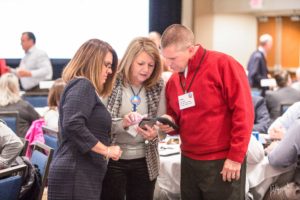Education has been disrupted by COVID-19 for over a year, and school leaders are doing all they can to keep their staff and students safe while continuing effective learning. As policymakers at all levels of government weigh how to tackle the full impact on our public institutions, making sure the voices of school leaders are included in those decisions is vital. The 2021 NASSP Virtual Advocacy Conference provides an opportunity for school leaders and others to learn how to effectively influence lawmakers through activism. With the event fast approaching, past conference attendees have been reflecting on their experiences.
A Seat at the Table
According to Derrick Lawson, principal of Indio High School in Indio, CA, “Advocating with your elected officials at the local, state, and national levels is so critical for educational leaders today. We have decisions in policy being made by people who have never been in the classroom or who do not know what … their policies look like in practice.” That’s what makes advocacy so important—making sure you have a voice and a seat at the table.
Taking those first steps can seem daunting—but the conference aims to empower school leaders as they work toward shaping educational policy. For Tracy Wilson, principal of Grand Haven High School in Grand Haven, MI, attending a previous Advocacy Conference gave her the tools she needed to advocate on behalf of students in her state. “Having the structured format to learn alongside school leaders and then spend time on Capitol Hill together was very beneficial,” she says.
For Lawson, another benefit was the broadened perspective. “I wanted to sharpen my skills and have the most current knowledge base in order to adequately and appropriately address policymakers at all levels. The conference gave me the opportunity to understand the intricacies of some of the larger initiatives that impact education that were on the table at that time.”
In this year’s conference, the “State of American Education” session will bring together expert voices from policymakers, elected officials, and school leaders to discuss how the current presidential administration will approach education policy and answer questions about the future of education.
Learning to Influence Lawmakers

The Advocacy Conference aims to give attendees the best practices for advocating to elected officials in order to make the biggest impact. “I think one of the most vivid experiences that I’ve had in the advocacy conference has been to interact and hear directly from former staff members that worked with legislators as well as current legislators and policymakers,” Lawson says. “I was able to hear what types of information they need and what the impact is of advocacy on their decision making. Realizing that for every person that reaches out to their legislator, there are hundreds more that have the same position but just do not take the time to reach out was eye opening. This helped me to understand the significance [that] even one letter, phone call, or email to a legislator has tremendous impact.”
One of the biggest takeaways of this knowledge is the confidence that comes from learning how to build these connections. Wilson agrees, “The NASSP Advocacy Conference has provided the confidence needed to reach out and make appointments with legislative leaders who represent our area in Washington.”
Those skills are invaluable not just for organized Capitol Hill initiatives, but also for establishing relationships with policymakers at all levels of government. You can even leverage connections during National Principals Month in October when principals invite lawmakers to their school for shadowing visits.
A Network of Support
During a year when school leaders have felt isolated by social distancing and challenged by work-life imbalance, the benefit of spending time—even virtually—with peers cannot be overstated. The NASSP Advocacy Conference brings together school leaders from varied school environments with a united purpose of improving education policy. “Learning and growing alongside school leaders from across the country is extremely valuable. It’s affirming to know that many people are dealing with the same concerns or issues all over the place and not just within our state.”
Establishing those deep peer connections gives you a network of support in your advocacy efforts. This year, a Virtual Social Networking Hour will wrap up the NASSP Advocacy Conference and allow school leaders, education advocates, and all attendees to connect and socialize as they share stories about past advocacy efforts and accomplishments.
Register today to attend the 2021 NASSP Virtual Advocacy Conference, and learn how to use your voice to help shape educational policy. It’s free to attend, and anyone who wants to advocate for public education is welcome. Check out the schedule of events, and register to join us on April 20!
